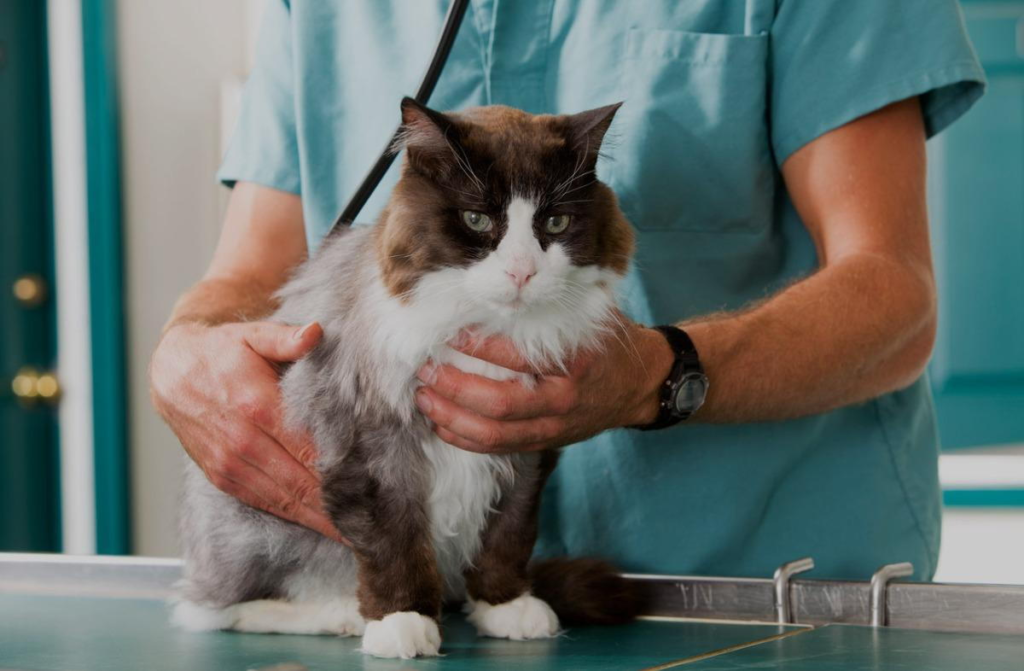Are you a pleased new kitten owner wanting to ensure your little pet enjoys a healthy, enjoyable life? Kittens, with their unlimited energy and inquisitive temperament, are prone to unique health conditions that might occur suddenly. Understanding these frequent diseases & common cat illnesses is vital for any pet caregiver. Imagine the peace of mind that comes with knowing you’re ready to avoid common cat health concerns, from respiratory infections to stomach disorders. By making proactive efforts, you can ensure your kitten’s well-being, ensuring they develop into healthy, happy cats. Dive into our complete article and empower yourself with important information to keep your kitten healthy.

Diabetes
Cats frequently get diabetes, particularly elderly male cats who are overweight, neutered, and primarily fed dry food. The most common kind of diabetes in cats is Type II, which is caused by poor insulin cellular response. Insulin is a hormone that is essential for controlling blood sugar levels. Read on to understand signs of diabetes in cats.
Cat Diabetes Symptoms
- Weight loss despite eating the same amount or more
- Excessive thirst
- Excessive urination
How to Prevent It
For both humans and cats, maintaining a healthy weight can significantly reduce the risk of diabetes. Keep an eye on your cat’s intake and reduce meal sizes if you notice that he or she is gaining weight. Although it hasn’t been demonstrated that a high-protein, low-carb diet will genuinely prevent feline diabetes, if your cat already has the disease, your veterinarian may advise following this diet.
Lower Urinary Tract Diseases
If your cat is having problems using the litter box, it could be a sign of a lower urinary tract illness that is inflaming the bladder or urethra. Urinary stones, bacterial infections, and stress are just a few possible causes.
Symptoms
- More frequent trips to the litter box
- Look of strain when urinating
- Urinating outside the litter box
- Blood in urine
- Licking around genitals
How to Prevent It
Anything that encourages cats to consume more liquids would be beneficial because they are more likely to develop urinary tract disorders if they are overweight or drink little water. Does your cat have anxiety? If you have multiple cats at home, make sure they have enough space and litter boxes, as well as enough places for them to hide and rest. This will help reduce their stress levels.
Skin Conditions
Cats may suffer from a range of skin conditions, such as allergies, bacterial or fungal infections, and parasites. The easiest method to determine whether your feline buddy has a skin disease is to look at how they groom and scratch themselves. Consult your veterinarian to find out what might be bothering your cat if you observe them scratching a lot or if you notice any hair loss.
Symptoms
- Excessive or more aggressive scratching
- Hair loss
- Bumps, sores, or scabs
How to Prevent It
The best defense against ringworm, fleas, mites, and other parasites and diseases is to keep your cats indoors. However, ongoing protection is still necessary, especially against fleas and ticks, as these pests can still find their way into your home. Find out from your veterinarian which preventative care options are best for your cat.
Dental Disease
One of the most frequent causes of cat vet visits is dental issues. Just like in people, a plaque accumulation can lead to severe gum swelling. It can progress into the more serious periodontal disease, which may need the extraction of infected teeth, if treatment is not received.
Symptoms
- Bad breath
- Swollen gum that sometimes bleed
- Appearing to be in pain when eating
How to Prevent It
Our cats’ teeth should be cleaned on a regular basis, just as we brush ours at least twice a day. Although they might not enjoy it (at first!), it’s worthwhile to help them form that habit as it will prevent costly veterinary expenditures down the road for treating oral illnesses. Your cat might be more receptive to dental treats and special chew toys as means of enhancing oral hygiene.
Kidney Disease
Our cats’ kidneys are extremely important to their overall health, so when they’re not functioning properly, it may be a major problem. Regretfully, many senior cats older than seven frequently experience this issue. It is frequently a chronic disease, which is a persistent illness with a difficult course of treatment. If your cat ate something toxic or got an infection, it could also be an acute, rapid illness. Kidney problems can be associated with other conditions and are complex, difficult to diagnose, and unpredictable.
Symptoms
- Weight loss
- More urination
- Drinking more liquids
- Vomiting
- Bad breath
How to Prevent It
Kidney issues in certain cats are inherited. However, there is still much we can do to reduce the risk. As wet food keeps your cat hydrated, it is favored over kibble. It’s not necessary to entirely stop giving your cat dry food; instead, gradually increase the amount of wet food in their diet. Ensure that water is always available and that the litter box is kept in good condition.
What Should I Do If My Cat Gets Sick?
Although there are situations when there is little we can do to keep our cats healthy, the good news is that there are many diseases that we can avoid. Maintaining your cat’s health and providing them with a nutritious diet might help prevent several ailments. Keeping your cat lean and active will help prevent diseases like diabetes and arthritis from developing, as these conditions are more likely to occur in overweight cats.
Regular flea and worming treatments from your veterinarian will help keep undesirable parasites at bay. It’s critical to receive quality care. The ones you may buy “off the shelf” are frequently ineffective, and it’s crucial to remember that several medications intended for cats may be detrimental to cats. Getting treatment from your veterinarian is the greatest option since they will recommend the best product for your specific situation.
Conclusion
Vaccinations help shield your new kitten from potentially dangerous diseases. In addition, it’s a good idea to periodically check your kitten’s health at home in between vet visits. In this manner, you can detect any signs as soon as feasible. Keep your kitten indoors until they have received all of their vaccinations. In the event that there are no outside cats nearby who are not vaccinated, you can choose to let them roam your garden as well and check out homemade cat treat recipes. They are all healthy for your kittens and cats.
FAQs
Q1: What disease is most common in cats?
Cats are most commonly effected by lower urinary tract diseases. There is a term called FLUTD which is kind of like an umbrella term for a variety of UTIs effecting cats. The best method to detect anything unusual is to keep an eye out for the liter box habits of your cat. If you see anything unusual, contact vet as soon as possible because it’s easier and less painful to get treatment as early as possible.
Q2: How do indoor cats get sick?
We tend to feel safe for our indoor cats but reality is that there are somethings that still need to be considered for their health. Sometimes, other pets and even we ourselves can bring germs from outside world. Also, cats are free beings and they need to play and run around, otherwise they get bored and sometimes even stressed causing them to become sick. So it’s very important to give them enough quality time each day.
Q3: How can I treat a sick cat at home?
If your cat is sick, you should discuss it with your vet first. There are a few things you can do at home to make it feel better. First thing is to create a quiet, restful environment where your cat can relax and secondly, keep hydrating and offering favourite food so it doesn’t loose all it’s energy.






